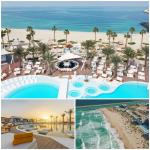Dubai continues to strengthen its position as a leading global education hub, with international student numbers seeing a sharp rise in the 2024–25 academic year. According to the latest data released by the Knowledge and Human Development Authority (KHDA), Indian students make up the largest group of international learners in Dubai, comprising 43 per cent of the total foreign student population in the emirate’s private higher education institutions.
The data highlights a clear trend: Dubai is attracting students from all over the world, but Indian nationals lead by a significant margin. Students from Russia and Pakistan each account for 6 per cent, followed by those from China (4 per cent) and Kazakhstan (3 per cent). Together, international students now represent 35.2 per cent of the total student population enrolled in private higher education institutions in Dubai.
Significant Growth in Student Enrolment
Dubai is currently home to 42,026 students spread across 41 private higher education institutions, including 37 international university campuses. These institutions offer a wide array of programs and qualifications, making the emirate an attractive destination for both students and academic professionals.
The 2024–25 academic year has seen a remarkable 20.4 per cent increase in total enrolment, up from 12.3 per cent in the previous academic year. This marks one of the highest growth rates in recent years, reflecting Dubai’s growing appeal as a centre for international education.
Notably, the proportion of international students has also grown, with intake rising from 25.3 per cent to 29.4 per cent. The increase suggests a rising global interest in Dubai’s educational offerings, thanks to its multicultural environment, international standards, and globally recognised qualifications.
Preferred Specialisations Among International Students
Business-related programs continue to be the top choice among international students, with 54 per cent opting for business degrees. This is followed by information technology and engineering, with 11 per cent each. Other areas of interest include media and design (6 per cent) and humanities (3 per cent).
When it comes to qualification levels, the majority of international students are pursuing bachelor’s degrees (53 per cent), while 37 per cent are enrolled in master’s programs. This shows that Dubai’s higher education sector is attracting a mix of undergraduate and postgraduate students, many of whom are seeking globally competitive degrees.
Academic Choices of Emirati Students
The KHDA data also provides insights into the academic interests of Emirati nationals, who make up a sizeable segment of Dubai’s student community. A total of 3,832 Emirati students are currently enrolled in private higher education institutions.
Among them, 62 per cent are pursuing bachelor’s degrees, 28 per cent are enrolled in master’s programs, and 8 per cent are working toward doctorates. Business remains the most popular field of study among Emirati students as well, with 42 per cent opting for it. Engineering comes next at 21 per cent, followed by information technology (15 per cent). Law and humanities attract 5 per cent each.
The figures indicate that local students, like their international counterparts, are gravitating toward fields that offer high employability and global relevance.
Faculty Demographics: Indian Academics Lead
In addition to student demographics, the KHDA report sheds light on faculty representation across Dubai’s private higher education institutions. The emirate employs 2,123 faculty members, bringing a diverse range of teaching and research expertise to its institutions.
Once again, Indian nationals are in the lead, making up 29 per cent of the teaching staff. They are followed by British academics (13 per cent), with Pakistani faculty (6 per cent) coming next. Educators from the United States and Lebanon each represent 5 per cent of the faculty population.
This diversity within the teaching staff enhances the international appeal of Dubai’s education system and helps deliver a well-rounded, multicultural learning experience.
Dubai’s Growing Appeal as an Education Hub
Dubai’s continued success in attracting international students and faculty can be attributed to several factors:
- Global Connectivity: Its strategic location between East and West makes it a convenient destination for students from Asia, Europe, and Africa.
- International Campuses: With 37 international university campuses, students have access to degrees from some of the world’s most respected institutions without leaving the region.
- Quality Assurance: The KHDA and other education bodies ensure high academic standards through rigorous accreditation processes.
- Lifestyle and Safety: Dubai offers a modern, cosmopolitan lifestyle in a safe and welcoming environment, making it an attractive option for students and their families.
- Career Opportunities: The city’s dynamic economy presents a wide range of internship and job opportunities for graduates, particularly in sectors such as business, finance, tech, and media.
Outlook for the Future
The sharp rise in both total and international student enrolment highlights the growing confidence in Dubai’s education ecosystem. As the city continues to invest in its higher education infrastructure and expand global partnerships, it is well-positioned to become a top-tier destination for students from around the world.
With Indian students leading the way and institutions adapting to meet evolving global demands, Dubai’s higher education sector is not only thriving — it is setting new benchmarks for academic excellence in the region.
Source : Gulf News
Image Courtesy : Internet










